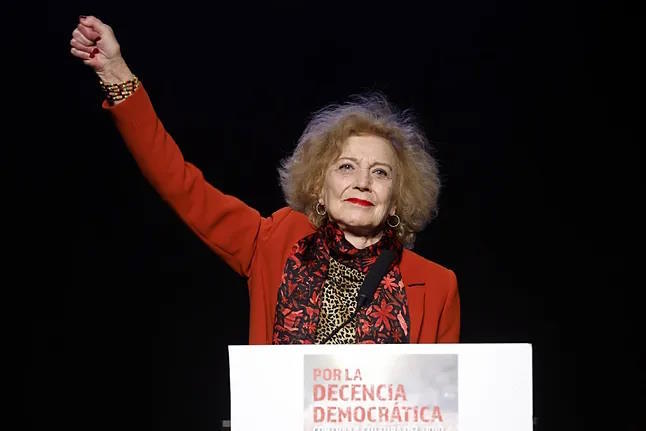It is not difficult to find with a simple Google search a political statement coming from Pedro Almodóvar and that group of women who surrounded him and became known as Almodóvar's girls: from Carmen Maura to Penélope Cruz, through Victoria Abril or Julieta Serrano. And it is even easier to find statements from the recently deceased Marisa Paredes, who has been most involved with the various left-wing parties in Spain in recent decades.
Already in 1975, in the final years of Franco's regime and during the actors' strike, Marisa Paredes was there. Although in the background, the actress from Madrid was one of those who supported the mobilizations of her colleagues to achieve labor rights they did not have at that time. In fact, in 1974, there was a first rebellion against the dictatorship that was appeased by the actors obtaining one day off per week in their theater performances, a point that sector employers strongly rejected. "That was the first great triumph of the profession," Paredes recounts in the documentary Mucha mierda, presented at the last San Sebastián Festival and which will be released on the 50th anniversary of the protests.
Where the actress was actively involved was in the Goya Awards gala of the 'No to War' in 2003. She was the president of the Film Academy at that time when the Animalario group was in charge of hosting a gala with continuous criticisms of the government of José María Aznar for participating in the U.S. invasion of Iraq. "Let's relax, there are many awards at stake and many nerves on edge, but let's relax. This is not a tense night, but a free one, it is the night of Spanish cinema, the Goya night so let's enjoy it, live it, share it," Paredes began her institutional speech.
Immediately after, she made reference to the Iraq War. "We must not fear culture, entertainment, or freedom of expression, much less satire or humor. We must fear ignorance and dogmatism. We must fear war," stated Paredes, who would leave her position a few months later citing professional reasons and closed that speech with a new reference to the conflict: "We only need coexistence, not invasion."
The actress was also present at the event organized by several actors in protest against the entry into the war at the Alcázar Theater in Madrid. Years later, in 2018, when the Film Academy awarded her the Honorary Goya for her career, she stated that she would repeat the same speech against the government.
Marisa Paredes was also actively involved in 2008 in what became known as the eyebrow movement, where the cultural world mobilized to support the then Prime Minister, José Luis Rodríguez Zapatero. Among those present in the front row of the event held at the Círculo de Bellas Artes in Madrid to show this support were the actress accompanied by Pedro Almodóvar, Concha Velasco, Ana Belén, or Cayetana Guillén Cuervo.
A political activism linked to left-wing parties that the actress never abandoned. In the last national election campaign, on July 23, 2023, Marisa Paredes participated in the kickoff rally of Sumar in A Coruña accompanying Yolanda Díaz. "Censorship of culture is something that we thought was already forgotten because it was hard for us to remove that censorship. And now they are censoring theater plays again, saying that there are certain things that cannot be said," stated the actress, coinciding with the cancellation promoted by two PP and Vox municipalities, Briviesca and Valdemorillo, of the plays El mar by Xavier Bobés and Alberto Conejero and Orlando by Virginia Woolf.
The actress even spoke at an event supporting Pedro Sánchez when the Prime Minister announced the five days of reflection, amid the investigation of his wife, Begoña Gómez, for her master's degree at the Complutense University. "It is truly moving to finally see that we are taking to the streets, holding events in support of democracy. To Pedro and democracy. [...] It was horrible to see that feeling of loneliness, helplessness, pain. Really, are we not going to do anything? Do we not have the deep feeling that the country is in a dangerous moment? We must take to the streets, shout, and say that we do not want to go back," Paredes stated to the applause of the audience at the Marcelino Camacho auditorium, at the headquarters of Comisiones Obreras in Madrid.
Especially noteworthy was the scene at the doors of Concha Velasco's wake at the La Latina theater in Madrid when the actress was speaking to the media and behind her appeared the President of the Community of Madrid, Isabel Díaz Ayuso. "What is she doing here? Out!", reacted Marisa Paredes at that moment, who had already been very critical of the popular leader on previous occasions regarding the tax cuts promoted by her government.
